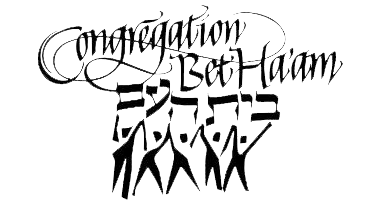Karen Hindall
For those who haven’t met me, I am the Executive Assistant and the Rabbi’s Assistant at Congregation Bet Ha’am. I have twice had the pleasure of traveling to Israel with Rabbi Saks and Bet Ha’am families.
Anyone who grew up watching Sesame Street learned that asking questions is a good way to find out things. Having already had the good fortune of visiting Israel as a wide-eyed tourist once before, I approached my second trip a little differently. This time, I had a personal agenda. I went to Israel with a list of questions. I wanted to know THINGS. Big, important THINGS, and I was sure, that if I just turned away from our tour group and the ancient sites that were in front of us, and instead watched the day-to-day living going on around me, I would have my answers. If I just talked with our tour guide over a beer, or chatted with our many new Israeli friends, I would get those answers.
Well, I learned two things in Israel. First, asking questions IS a good way to find out things. I also learned that if you ask two Israelis one question, you will get three responses in return.
I learned there is no one right or wrong answer to the Israeli – Palestinian Conflict. After our group’s mifgash, our encounter with the warm and welcoming Reform congregation of Tzur Hadassah, and their equally gracious Palestinian neighbors from nearby Husan, I was left with many different perspectives to think about and unpack. There was no consensus among the two groups about the Conflict – one state, two states, or some other solution entirely – but there was respectful dialog between them and the promise of ongoing work towards hope and peace. Again, one question, many opinions.
I learned there is no easy solution to the controversy of how Israel, a country the size of New Jersey, is supposed to absorb the 38,000 asylum seekers from Sudan and Eritrea, who arrived in Israel between the years of 2006-2012. Many of these immigrants have settled in South Tel Aviv, a crowded and expensive area undergoing extensive gentrification. The graffiti street art we saw during our group’s walking tour in the South Tel Aviv neighborhood of Florentin quite literally illustrated some of the local artists’ many opinions on the topic of immigration. Jewish values, an understanding of our own difficult history, and a desire to welcome the stranger, demand that a just solution is found to the problem, yet it is clear there is no consensus in Israel on how to go about doing so.
Two ten-day trips are not long enough for me to even begin to understand the complexities of life in Israel. I would be naive in thinking I have even scratched the surface. I’m glad I approached my visit differently than I did two years ago, but I am still left with some big questions – questions without answers. Can peace ever be achieved in Israel when Jewish Israeli children rarely get to know the Arab Israeli children living next to them? Will we Jews ever stop fighting amongst ourselves and become more accepting of each other in spite of the differences in how we choose to exhibit our Jewishness? Will we ever stop tearing apart our own communities over the subject of Israel’s existence and the ongoing conflict with the Palestinians? Will there ever come a time when Rabbi Saks and I can walk side by side all the way down to the Western Wall together, or will we continue putting our hand-written messages of hope into crevices at the Southern Steps instead, because an egalitarian prayer space has still not been constructed? As a woman, can I ever expect to pray with Women of the Wall, wearing my tallit, and carrying a Torah, without noise, disruption, and possibly violence while I do so? Will we ever stop using generalized words like “us” and “them” and instead choose to tackle our fear of people who may be different than us by just sitting down and having a cup of coffee with someone that we haven’t yet met?
My family has asked me why I want to keep returning to Israel, a place I’ve now visited twice when there are many other parts of the world I have not yet explored. One of our trip participants, Lee Tabenken, summed it up nicely. To paraphrase, he said that Israel feels like a blanket that wraps around you. I look forward to experiencing that feeling again and again.
Thank you very much to the anonymous individuals from the Bet Ha’am community who helped to fund my trip to Israel. I am grateful for your generosity. I’m donating this book to the Bet Ha’am adult library in your honor. It’s a recent release called Jerusalem, Drawn and Quartered, by a writer named Sarah Tuttle-Singer who I admire for her love of Jerusalem, her clarity of thought, and her convictions that peace can only be achieved when people begin talking and getting to know one another over a cup of coffee.
Shabbat Shalom!

